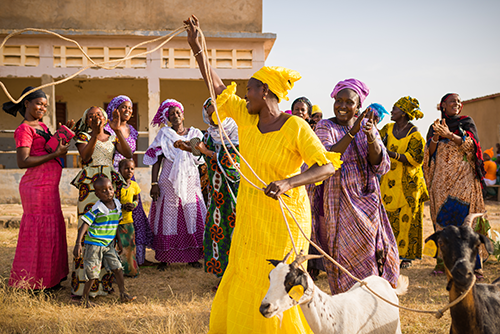
One of the pillars of NCBA CLUSA’s programming is our commitment to gender equity and social inclusion. By addressing gender dynamics, we empower individuals and families around the world to achieve resilience, economic security and improved quality of life.
NCBA CLUSA conducts gender analyses and formative research to inform our project design, implementation, and monitoring and evaluation on the relevance of gender norms, access to resources and opportunities, and ways to identify entry points for decreasing gender gaps and empowering women. We have carried out this research for projects in East Timor, Mozambique, Zimbabwe, Senegal, and Burkina Faso and Niger.
Our cross-department Gender Equity and Social Inclusion working group centers these efforts, ensuring that NCBA CLUSA prioritizes investments in marginalized and underrepresented populations in its development work. As NCBA CLUSA’s Technical Specialist for Nutrition and Resilience, I’ve been privileged to act as interim lead of this working group.
As a sub-contractor on the U.S. Agency for International Development (USAID)’s Advancing Nutrition project, NCBA CLUSA supports gender integration across the project’s multiple focus areas. To this end, NCBA CLUSA has been instrumental in ensuring gender is considered across the project’s Nutrition in the Humanitarian Context and Food Systems work.
As part of the project’s Food Systems focus area, I was the lead writer on a technical brief called Working Within the Food System: Gender Considerations for Improved Diets. Recently published by USAID, the brief describes how to take evidence-based food system actions that address gender to improve diets. The publication is part of a series of technical briefs that provide guidance for multi-sectoral nutrition programming across agriculture and food systems in support of the U.S. Government’s Global Food Security Strategy and (USAID’s plan under that strategy.
The brief frames gender considerations around the USAID Bureau for Resilience and Food Security’s Food Systems Conceptual Framework and describes how gender norms influence and are influenced by the components and drivers of the food system, using examples from research and USAID programming.
Key Takeaways from Working Within the Food System: Gender Considerations for Improved Diets
Investments to improve diets and nutrition through food systems should:
- Enhance women’s roles in agriculture and food systems and address barriers to accessing activities and technologies that decrease labor burdens
- Facilitate women’s participation in diversified off-farm livelihoods as processors, entrepreneurs, traders, and wage workers, and include workplace support to offset risks to household nutrition
- Ensure women’s opportunities for income generation, decision-making, and control over household income
- Strengthen access to high-quality social and behavior change for women and men
- Involve men and boys when seeking to address gender norms that restrict women’s and girls’ participation in the food system.
It was a welcomed challenge to delve into existing literature and draw upon the legacy of NCBA CLUSA’s work over the past 50+ years. Based on global evidence and our specific programmatic experiences in projects like USAID Yaajeende, Feed the Future Senegal Kawolor, USAID REGIS-ER in Burkina Faso and NIGER and PROMAC in Mozambique, we give concrete examples of how to consider gender across all parts of the food system.
These include agriculture production, markets and household consumption, and the multiple drivers that influence these components. It took a village to get this brief from concept to reality, drawing upon the critique and expertise of NCBA CLUSA and USAID Advancing Nutrition colleagues and USAID technical staff. The brief is now available online. It is my hope that it will help guide practitioners on how to center gender when designing, implementing and evaluating food systems programming for improved diet and nutrition in USAID’s global work.
—Charlotte Block is NCBA CLUSA’s Technical Specialist for Nutrition and Resilience


